China’s seniors have remarkable stories to tell. And they’re turning them into memoirs
While the endearing practice could provide some emotional comfort, experts raised concerns about privacy risks and unscrupulous businesses preying on seniors.
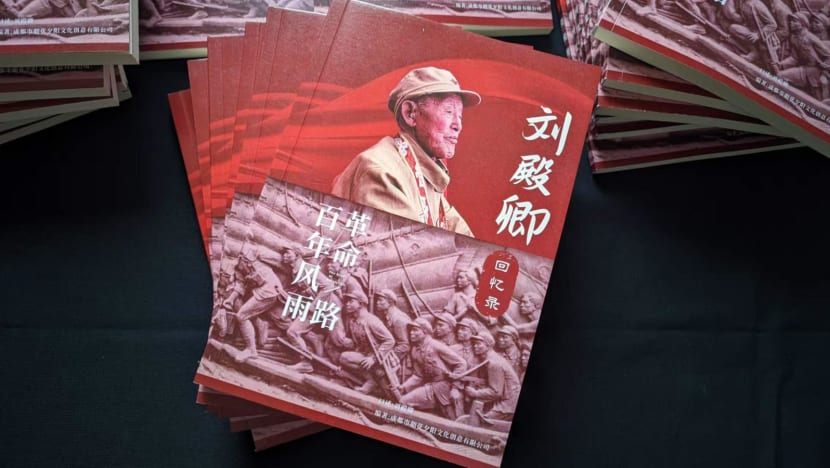
Like many seniors in China, at 97 years old, Liu Dianqin decided to hire a ghostwriter to complete a memoir as a keepsake for himself and his family. (Photo: Chengdu Zhaohuaxiyang Culture Creative Co., Ltd)

This audio is generated by an AI tool.
SINGAPORE: At 97, Liu Dianqin has led an eventful life during some of China’s most tumultuous periods.
Born in 1929 in central Henan province, Liu recalled once having to beg for his next meal.
He also enlisted in the People’s Liberation Army (PLA) twice before devoting his later years to serving residents in Batang County, Sichuan.
These might not sound like the most dramatic of stories for public reading but to Liu's family, they are precious and important memories.
“Although he wasn’t caught up in fierce battles or bombings, nor was he some heroic figure, it was only when recounting his story for this book that he finally shared all these finer details,” said Liu’s daughter.
Now with the help of a professional memoir writing company, Liu is telling his rich life story and is part of a burgeoning trend of elderly Chinese citizens doing so.
Working with a small team of writers in Sichuan’s provincial capital Chengdu, Liu spent three months working on his more than 200-page memoir titled “A Liu Dianqin’s Memoir” - sharing anecdotes and other life experiences through lengthy verbal interviews.
“I’m so happy to share my life in a book, I’m overwhelmed,” Liu told the Sichuan Observer news outlet in November last year.
“He also wore a military suit when receiving the book, flipping through the pages and tearing up,” his daughter said.
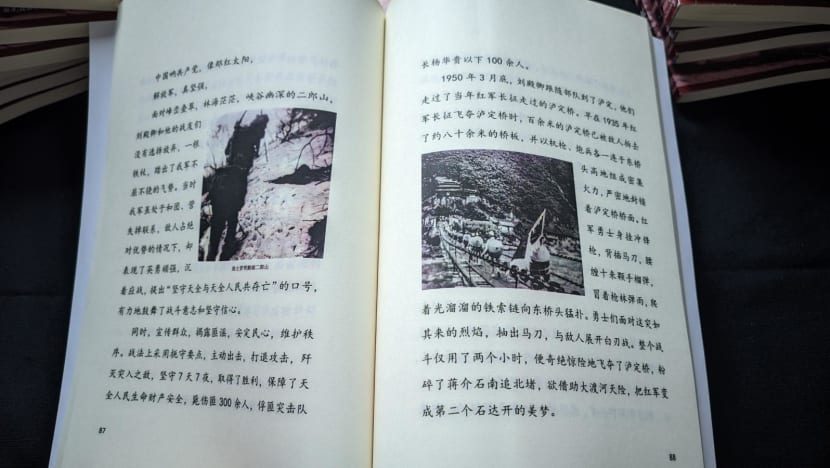
‘SILVER’ MARKET POTENTIAL
While China has tried to stave off its demographic crisis, entrepreneurs and industry watchers see golden business opportunities tapping into the country’s booming “silver economy”.
More than a fifth of its people, around 296 million, are now aged 60 and over and this number is forecasted to rise by at least 40 per cent, exceeding 400 million by 2035.
“Even if one in a thousand, or one in ten thousand, hires someone to write their memoirs, it’s still a very large group… large enough to support an industry,” said Zhang Xin, an associate professor from Peking University’s School of Psychological and Cognitive Sciences, specialising in developmental psychology.
“Memoir writing makes sense from a psychosocial perspective,” he told CNA, adding that he expects it to grow in popularity among seniors.
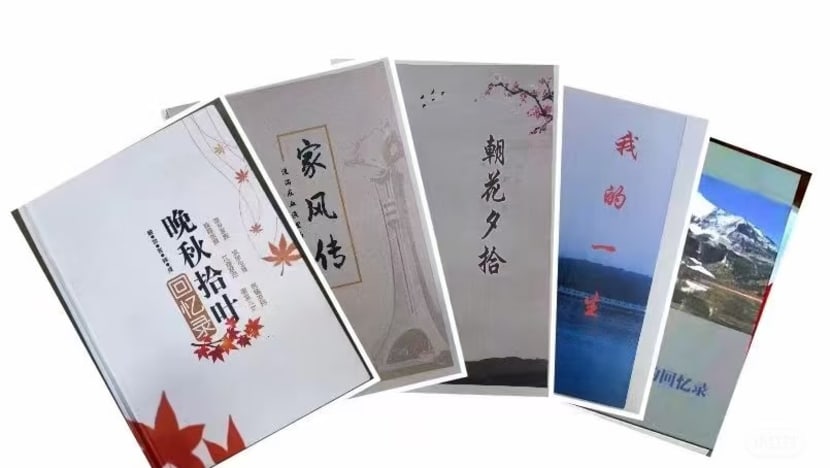
Passing down memories and beliefs is a deeply personal experience but it can also be a tedious one.
Liu’s author Zhao Yuxi, a part-time writer, decided to start his own business, Chengdu Zhaohuaxiyang Culture Creative Co., Ltd in 2018 after penning a memoir for a friend’s parents.
He employs young writers, mostly in their 20s and 30s, to help bring seniors’ personal histories to life.
Memoir writing is something he’s done extensively, Zhao told CNA, mostly for acquaintances who wanted to preserve their parents’ legacies.
With his team, he has already completed 30 memoirs.
Last June, they attended an elderly care expo in Chengdu - receiving more than 100 orders and inquiries in just three days
"There are more inquiries now post-pandemic and with greater media exposure in late 2024, I believe there is a lot of potential,” Zhao added.
"I think the industry could become like wedding photo shoots - encompassing customised (services)… and marking a new life stage."
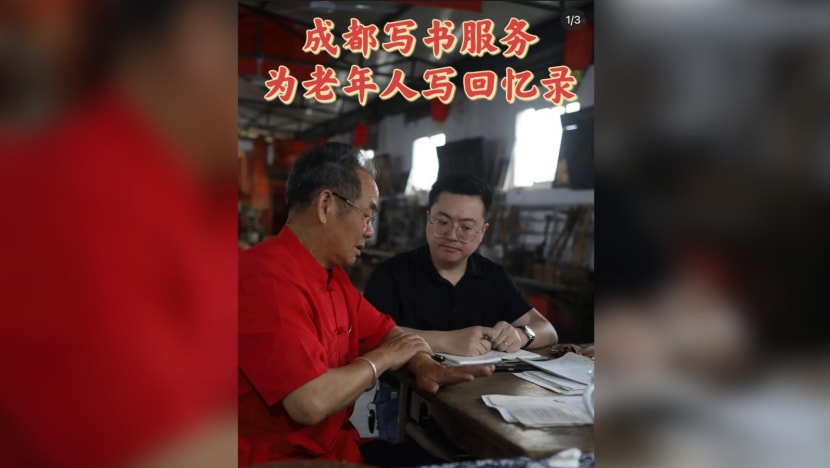
Also hoping to tap into the silver senior market is He Shuyue, a 40-year-old former IT worker from Guangdong province who left a stable “iron rice bowl” job at a state-owned finance enterprise to launch his own memoir-writing agency, Yueplus.
Using artificial intelligence (AI) writing tools, He and his team of 10 proofreaders, turn personal experiences into full-length customised memoirs in as little as 45 days - quicker compared to traditional writing methods that would involve conducting multiple rounds upon rounds of in-person interviews that could take months.
He often reaches out to senior-learning institutes, nursing homes and other dedicated elderly facilities to market his AI memoir writing services.
“China’s silver economy is taking off so I looked into starting my own business in this field,” He told CNA, adding that he had spent 8 months doing domestic market research before taking the leap.
And his efforts are slowly paying off.
Since the company’s launch in July 2023, it has received more than 30 requests each month, a figure that has remained steady since its start.
“Business is growing but we haven’t found a model that can be easily replicated so the volume hasn’t exploded yet,” He said.
Writing memoirs for seniors makes sense from a psychosocial perspective, said Zhang Xin.
“In the final stages of one’s life, people reflect on whether they feel proud of their accomplishments or regret their past,” Zhang said. “Memoir writing, in a way, fulfills that purpose.”
And with considerably more wealth and free time, Chinese seniors today “might feel (they are) able to pay for this final life project,” he added.
The writing process can also be therapeutic for elders, providing an "opportunity for self-forgiveness and self-acceptance", especially for those long been burdened by feelings of regret and remorse, said Zhang Baoshan, a doctoral supervisor at Shaanxi Normal University’s School of Psychology.
"It helps them present their life experiences in a positive way and find meaning in them, alleviating regret and facilitating self-reconciliation," he added.
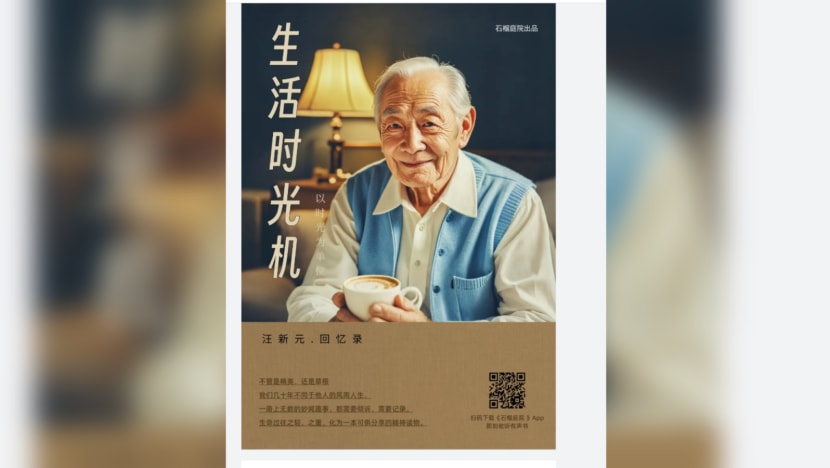
TURNING LIFE EXPERIENCES INTO A BOOK
The process typically begins with a casual meeting where writers will get to know their elderly subjects - sharing ideas as well as gathering details, anecdotes and life experiences.
After that, more in-depth interviews will take place to capture the heart and soul of the story.
For companies like He’s which make use of AI, interview transcripts are input into a system that readily transforms raw text into a polished, ready-to-publish memoir.
Zhao and his team conduct lengthy two-hour interview sessions with seniors - anywhere from four to eight sessions.
After each round of feedback, they will revise and refine the manuscripts until the client feels the story truly reflects their life.
“We usually set a list of about 200 topics covering different life stages,” Zhao said.
“Seniors pick the memories they want to highlight, and sometimes the family also wants input, so we share the questions with them.”
HOW MUCH WILL IT COST?
In China, the cost of hiring a writer or an agency varies and is dependent mainly on skills and the memoir’s length, experts told CNA.
A memoir can cost anywhere between 10,000 to 80,000 yuan (US$1,365 to US$10,920) depending on the length and customisation like the style of writing and writer’s experience.
At Yueplus, an AI-written memoir can cost anywhere between 10,000 to 20,000 yuan, He said.
Most clients want a few simple printed copies “for their own perusal”, he added, but there have been requests for formal publications too - where memoirs are published and sold commercially, which could fetch additional costs of up to 30,000 yuan.
“The profits from book sales are all theirs to keep,” He said.
For Zhao and his team, who adopt a more labour-intensive approach, a completed memoir spanning over 200 pages and comprising anywhere between 60,000 to 70,000 words, could cost between 10,000 and 30,000 yuan.
POTENTIAL PITFALLS
But while the endearing practice serves as a form of emotional comfort for elders, experts have also warned of potential pitfalls.
Seniors could be left exposed to privacy risks and there is also concern about vulnerability to scams and unscrupulous businesses taking advantage of their trust.
When reminiscing about their past, seniors may also inadvertently reveal personal or financial information if the interviewer acts with malicious intent.
AI-driven services also raise concerns over privacy and data protection.
"AI cannot fully incorporate an older person’s cultural background or genuinely reflect the richness of their life story and inner world," said Zhang Baoshan,
Although technology can speed up and streamline the writing process, it "struggles to capture the subtlety and complexities of human emotions", he added.
“The greatest issue with generative AI is its lack of human warmth and empathy - producing content that feels “cold,” de-personalised and detached from the nuanced emotional (experiences) of older adults.”
Older adults’ recollections can be subjective, occasionally omitting facts or reflecting personal bias, potentially leading to misunderstandings or harm.
“Without proper ethical guidelines, these narratives may spark family disputes, privacy breaches, or even broader social controversies, particularly for public figures,” said Zhang Xin.
From a regulatory standpoint, Zhang Yi, CEO of the iiMedia Research Institute, expressed concerns about the commercialisation of the service and said platforms and publishing institutions must ensure proper vetting of memoir material.
“Memoirs often carry significant value in shaping societal narratives, necessitating oversight from relevant authorities such as publicity, publishing and internet supervision departments,” he told the state-run Global Times in late November.
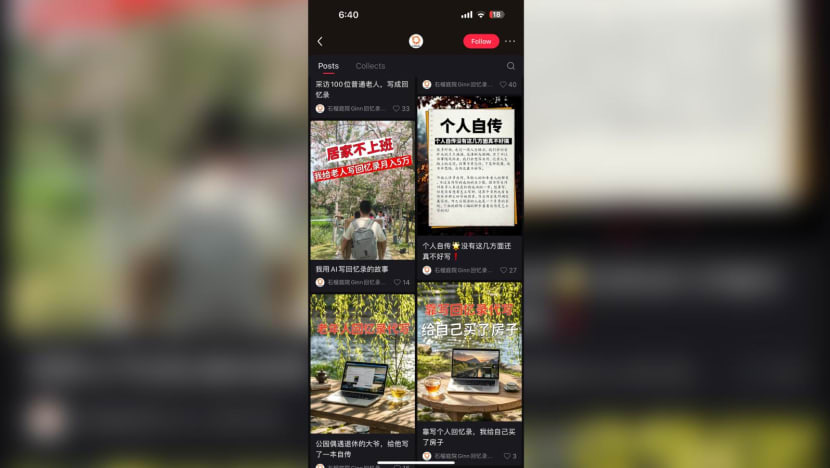
For Zhao, there is still great meaning in helping China’s seniors to preserve and tell their life stories.
“So many young people have moved away from their parents and grandparents,” Zhao said.
“This helps them understand what life used to be like.”
















